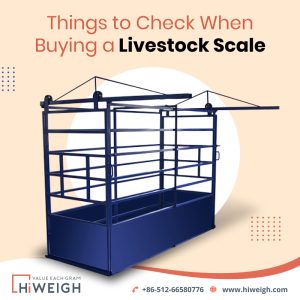


Accurate weight measurement is vital in agricultural and livestock industries for effective herd management, health monitoring, and optimizing productivity. Livestock scales are a necessary tool to ensure accurate data for decision-making, whether monitoring animal growth, the administration of medication, or selling livestock. The many options available from various livestock scale manufacturers make this decision overwhelming. This guide explores what the top features are when looking for a livestock scale, as well as what helps you pick the right equipment for your farm or ranch.
Read our latest post on How Livestock Scales Improve Herd Health
1. Longevity and Build Quality
These livestock scales are mostly used and exposed to tough environmental stress. Thus, high-quality and durable material for the scale is very important. The quest should be for
Heavy-duty steel construction provides strength and stability to accommodate large animals and repeated usage.
- Corrosion Resistance: It prevents dampness, manure, and cleaning chemicals from affecting the scale.
- Weatherproof Design: Absolutely required, especially for outdoor applications and changing environments.
Durability will protect your investment besides offering consistent service over the long term.
2. Weight Capacities
These weighbridges have different size ranges. For instance, when buying a scale, it will depend upon the size and weight of the animals to be weighed. Such categories include
- Small Scales: Suitable for weighing animals such as sheep, goats, or even pigs.
- Large Scales: Designed to accommodate cattle, horses, and other large livestock.
- Multi-Purpose Scales: Accommodates a wide variety of sizes of animals.
An appropriate selection of scale and weight capacity prevents equipment damage and safe measurements.
Also, read Why Every Farmer Needs Calibration Weights in Their Toolbox
3. Thoroughness and accuracy
Accuracy is a non-negotiable feature in choosing the livestock scale. This entails having accurate weight measurements for:
- Feeding Programs: Monitoring growth in feed to be adjusted End.
- Medication Dosing: The medication is dosed based on weight.
- Market Transactions: Ensuring you’re paid fairly for your livestock.
Look for scales with minimal margin of error and advanced load cells for assured consistency in accuracy.
4. Ease of Use
Efficient farming requires equipment that simplifies tasks, not complicates them. Important in using features to enhance usability are:
- Digital Displays: Large screens with clear weight readings.
- Automated Functions: There are tare weight capacities, memory storage capacity for multiple readings.
- User-Friendly Interface: Simple controls and minimal setup requirements.
With intuitive design, anyone in your organization will be able to effectively use it without time-consuming training.
5. Mobilitas
For farms that weigh at various locations, portability becomes necessary. You would be able to move portable livestock scales around according to your area of weighing, making it easier to weigh animals. Consider having the following features:
- Lightweight Construction: Without compromising durability.
- Wheels or Handles: For comfort in mobility.
- Compact Design: Guarantees the scale is easy to store when not in use.
Portability ensures flexibility, saving time and effort in its daily operations.
6. Animal Restraint Options
Livestock weighing is frequently confronted with anxious or agitated animals. Special restraint varieties on the scales assure one about both safety and accuracy in weighing.
Keep animals secure while on the scale. Built-in gates or cages.
- Non Slip surfaces: Prevent falls and, consequently, injuries, thus reducing stress.
- Solid Barriers: Provide a safe environment for both the animals and handlers.
These features restrict movement in weighing, thus reading more convincingly.
7. Data Recording and Integration
Modern livestock scales often come with advanced technology for data management. Key features to look for include:
- Data Storage: Store weight measurements for multiple subjects for later use.
- Connectivity: Bluetooth or Wi-Fi data transfer options to a computer or mobile device.
Integrates with farm management software for simplification of record-keeping and analysis.
Accurate data collection helps in tracking trends, improvement in herd health, and optimization of productivity.
8. Power Options
Depending on your farm’s location and infrastructure, consider the scale’s power requirements:
These battery-powered scales are portable and offer flexibility-especially in remote areas.
- Solar-Powered Options: Eco-friendly and cost-effective to use outdoors.
- Plug-In Models: Reliable Power for Stationary Scales.
Choose a power option that aligns with your operational needs.
9. Maintenance Requirements
Like any equipment, livestock scales require regular maintenance to ensure longevity and accuracy. Opt for scales that are:
With smooth surfaces and few crevices, there will be little dirt or manure buildup.
- Simple to Calibrate: User-friendly calibration processes maintain accuracy.
- Durable against wear and tear: Quality materials help reduce the chances of repair work. Scales with low maintenance demands save time and reduce long-term costs. 10. Cost versus Value For sure, price would be the consideration, but investment in value would be in the added features, durability and life spans of the scale. A quality scale might cost some more at the purchase, but it would save money with its durability, accuracy, and what constitutes downtime.
Conclusion
The appropriate livestock scale is an important decision that affects your farming operations by focusing on efficiency and actual success. Prioritize features such as strength, precision, simple yet straightforward use, and data integration to ensure that your investment matches the needs of your farm. Also, check whether it’s made by a reputed livestock scale manufacturer before buying it. A reliable livestock scale is not just a tool but an essential partner in managing the livestock effectively and sustainably.
